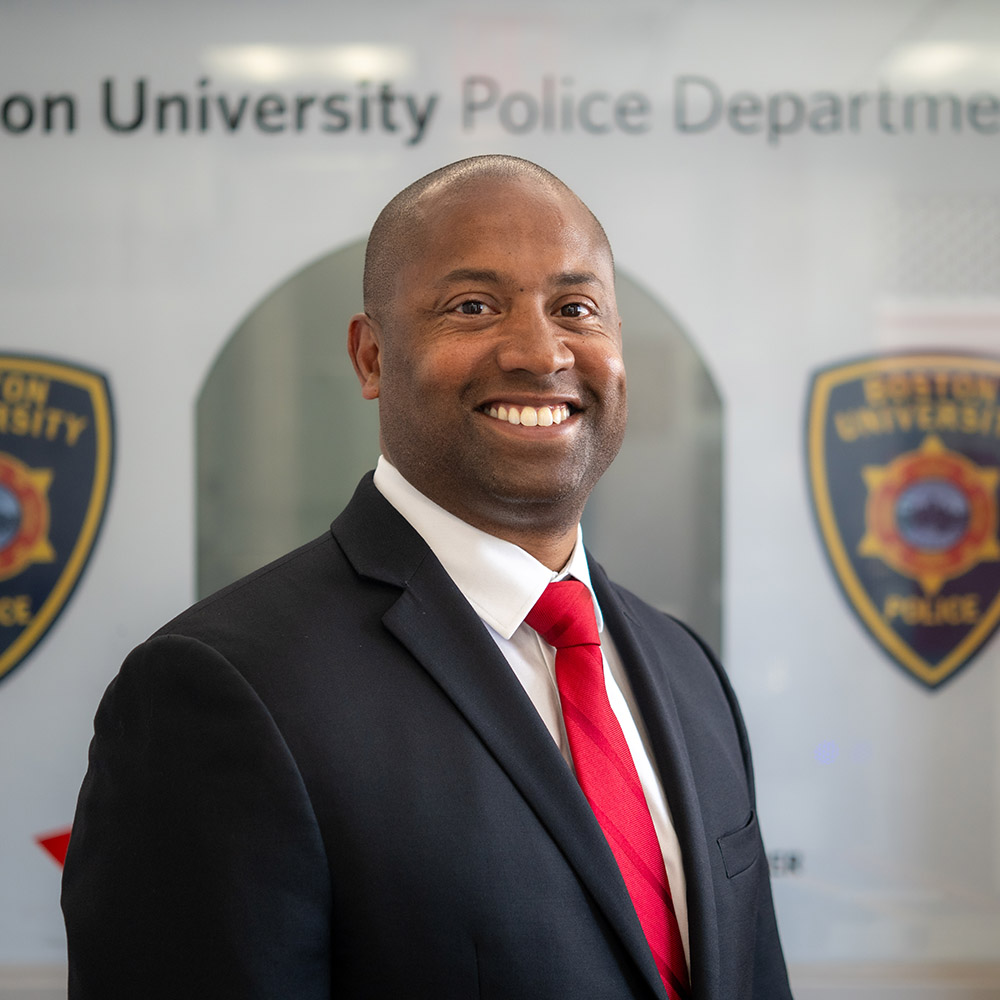Getting Police Officers to Trust Implicit Bias Training

Researchers found law enforcement officers “clearly value a rational, science-based approach to understanding their own minds as a guide to improving professional conduct and police-community relations.” Photo by kali9/iStock
Getting Police Officers to Trust Implicit Bias Training
BUPD chief and Harvard researchers collaborate to show a scientific approach works
Education may be increasingly important for leaders in law enforcement, but we only know of one police chief who has been published in the scholarly journal Philosophical Psychology, which hosts articles on cognitive science. That’s Boston University Police Department Chief Robert Lowe, one of three authors of a paper published in the journal earlier this year, titled “Change in attitudes and beliefs about implicit bias education: a demonstration among members of a police department.”
The study grew out of Lowe’s interest in finding a way to reach police officers who may be resistant to diversity training, perhaps because they feel like it’s finger-wagging or blaming them.
“In my career as a police officer, attending diversity-type trainings for over 20 years, that was not done effectively,” Lowe says. “So, what we were trying to get at was, if we reframe the conversation, if the conversation is rooted in science and is objective, would that change [officers’] attitudes?”

The study examined two diversity training sessions at the Cambridge Police Department and found that officers were more positive about the importance of implicit bias training after attending a science-based education course that also steered away from hot-button topics like excessive force incidents and examined bias in more mundane situations.
Lowe coauthored the study with Mahzarin R. Banaji, a Harvard University psychology professor, and Joseph A. Vitriol, an assistant professor in organizational behavior at Lehigh University and a lecturer at Harvard Extension School.
Law enforcement officers “clearly value a rational, science-based approach to understanding their own minds as a guide to improving professional conduct and police-community relations,” the study says. And the researchers wrote that they found “significant, even dramatic attitude and belief change among members of a police department concerning the value and importance of implicit bias education.”
The results were not expected, Banaji says. “That is, we were quite prepared to learn about the negative attitudes toward implicit bias education that police officers held—and we found that to be the case in the pretest,” she says. “But we didn’t expect to see the statistically robust shifts in a positive direction in the attitudes and beliefs about implicit bias education we received after the session. And this was often from the very same participants who had expressed negative attitudes earlier.
“These data are the basis of optimism and hope that teaching, if effective, will be recognized and absorbed,” she says. “When bias training goes wrong, it is not the fault of the police officers; it is that the teaching of it is typically substandard.”
The results were sufficiently positive that Lowe hopes to arrange a similar program for BUPD in the near future.
Depressurizing Controversial Topics
Incidents and controversy in the last few years, notably the murder of George Floyd by a Minneapolis police officer, have made it important for law enforcement to address implicit bias—thoughts, feelings, and behaviors, such as stereotyping, of which we may be unaware or unable to control. When police departments’ stated values support diversity and equal treatment, but the data shows arrest and other disparities based on identity—such as gender, sexuality, race, or religion—implicit bias is commonly evoked as an explanation. But Lowe says trainings to address the problem are not always welcomed.
“Policing can be a kind of insular culture,” he says. “And so you have people outside of the culture that come into police agencies, and they have great intentions, but maybe not the best delivery in terms of how to present this material.”
Before joining the BUPD last year, Lowe served for 22 years with the 300-member Cambridge PD in his hometown, where he had started as a patrolman and, by last year, had risen to superintendent of the operations division.
“At least in Cambridge, typically, this training was mandatory,” Lowe says. “And typically, the people that are presenting the information are not social scientists. And when that conversation wasn’t grounded in science, when that conversation could be subjective, I think officers could be very defensive to that conversation. And that’s when you see [officers] shut down.”
The study idea started when he heard Banaji speak to Cambridge city employees more than five years ago. She had founded a free education program that focuses on the science of implicit bias.
“That was a kind of turning point for me in my career, because I had never heard someone present this material the way that Dr. Banaji does,” Lowe says. “Dr. Banaji comes in to say, ‘These are the ways that our brains have been designed. And this is how it manifests itself in these moments. And even I have implicit bias.’ And once that kind of message is conveyed, you can see people’s defenses lower.”
Lowe went up to her after her talk and asked if she would be willing to work with the Cambridge PD. Together, they evaluated officers’ attitudes and beliefs before and after two in-person implicit bias seminars. Banaji had never worked with a police department before.
Lowe says it can be intimidating for an outsider to speak in front of a group of officers and start a conversation about controversial topics like how race influences policing. So, instead, they shaped the presentation to avoid confronting those issues head-on. Rather than diving into picking apart implicit bias in a use-of-force incident, for example, they’d talk instead about personnel and hiring decisions. They also focused on explaining the science of how bias works in the brain.
“So, it really was somewhat depressurized,” Lowe says, “staying away from car stops, use-of-force incidents, traditional incidents that have touch points, flash points, that have been national conversations, have sparked civil unrest.”
Another critical decision was that participation was voluntary. Lowe had known many of the Cambridge officers for as long as two decades and had developed a trust with them. “I called everyone personally to say, ‘I would love for you to come and listen to this presentation. No pressure, you can say yes, you can say no,’” Lowe says. “I don’t know if we had made this a traditional mandatory process, if we would have received the same data.”
“When the police walked into the room for our session,” Banaji says, “they were, in my opinion, slightly uneasy or at least a bit awkward. They teased me by asking if I was going to make them draw murals on the wall and sing ‘Kumbaya.’ By the end of the session, there was a buzz in the room—they were discussing the science among themselves, and there was a long line waiting to ask me more questions.”
A “Dramatic Opinion Change” among Officers
Lowe and the researchers conducted a survey before each of the two seminar sessions, evaluating the officers’ attitudes and beliefs about diversity education in general; afterward, they posed the same questions, but about the specific seminar. Some 263 Cambridge officers attended one or both of the two sessions and completed the surveys. The study found “substantively large, statistically significant differences in attitudes toward diversity training” after the seminars.
“The feedback that we got from the people that attended was just overwhelmingly positive,” Lowe says.
According to the paper, the study provides “one of the first demonstrations of significant and even dramatic opinion change” among officers in regard to the value of understanding implicit bias as a path to increased equity and accountability.
“Results clearly indicate that participants held negative preexisting beliefs or expectations about the benefits and effects of diversity training in general, and relatively pessimistic expectations that police-public relations could be improved,” the researchers concluded. “However, following participation in our [seminar], these perceptions changed dramatically; participants not only liked the seminar but also viewed it as important and valuable to law enforcement and the communities they serve.”
Banaji credits Lowe’s involvement as key to obtaining worthwhile results.
“Why should a police department trust an unknown professor to collect data from them?” she says. “Without the involvement of a senior member of their department, we could not have even begun to understand the issues that police confront, the questions we should pose, and how best to pose them. We were not asking easy questions like, ‘Do you like the Red Sox or the Yankees?’ We were asking hard questions about their decision-making, their biases, their ability to do their job effectively. To get truthful answers on survey data, there needs to be trust on the part of the subjects of research. And Rob Lowe’s involvement created that trust.”
Lowe’s dissertation for his doctorate in education from NYU Steinhardt, which he earned last year, also addressed implicit bias. He is optimistic about the potential long-term impact of the results.
As the paper says, “Self-reported attitude change is most emphatically not an indication of reduction in bias in the trenches of policing. Nevertheless, positive shifts in attitudes and beliefs about bias education is a notable step forward, as it likely reduces resistance to procedures and policies for individual and institutional reform that might otherwise remain elusive.”

Comments & Discussion
Boston University moderates comments to facilitate an informed, substantive, civil conversation. Abusive, profane, self-promotional, misleading, incoherent or off-topic comments will be rejected. Moderators are staffed during regular business hours (EST) and can only accept comments written in English. Statistics or facts must include a citation or a link to the citation.